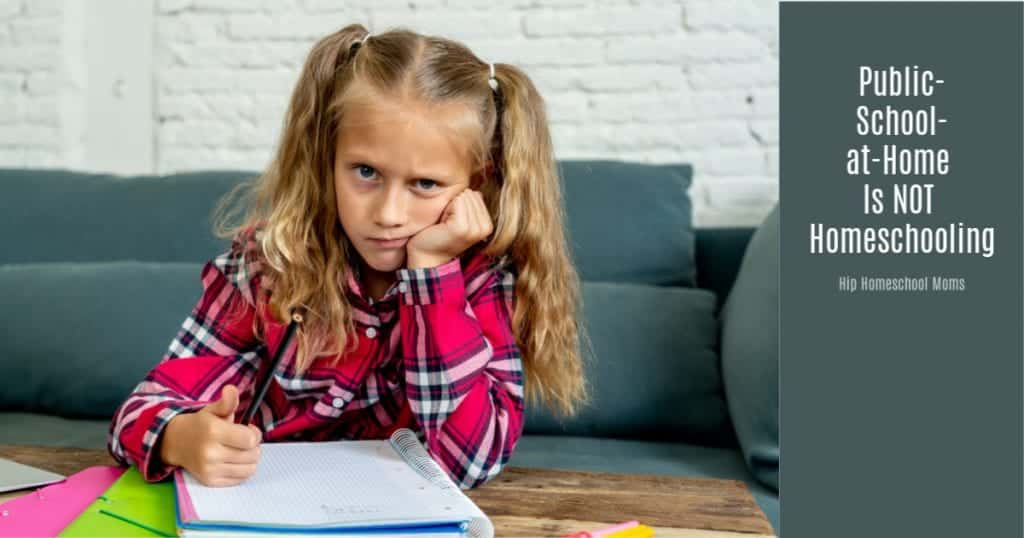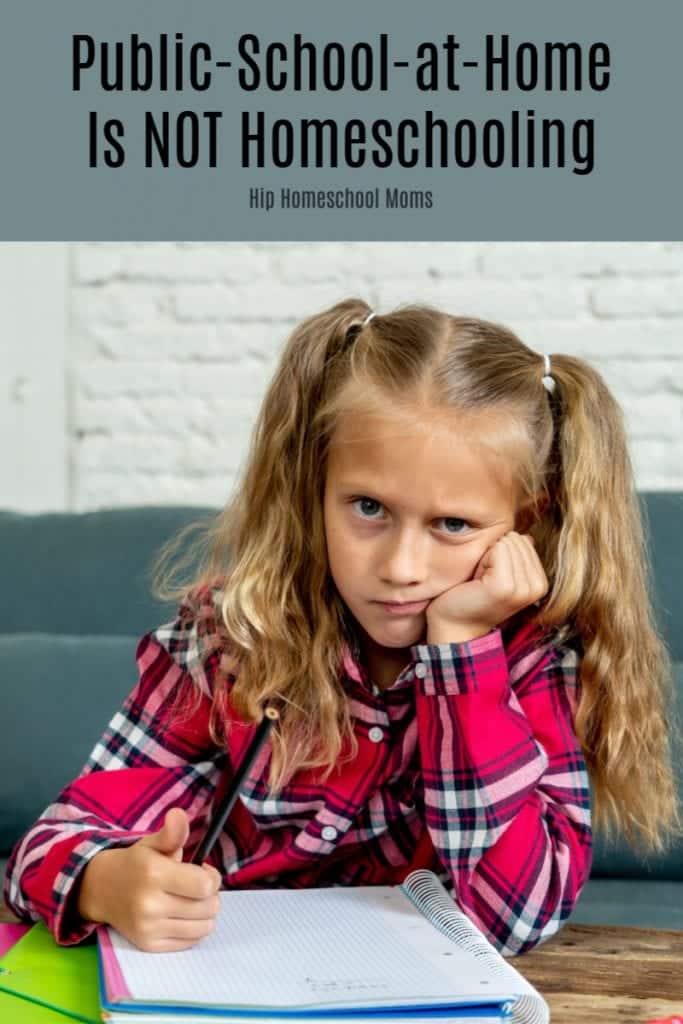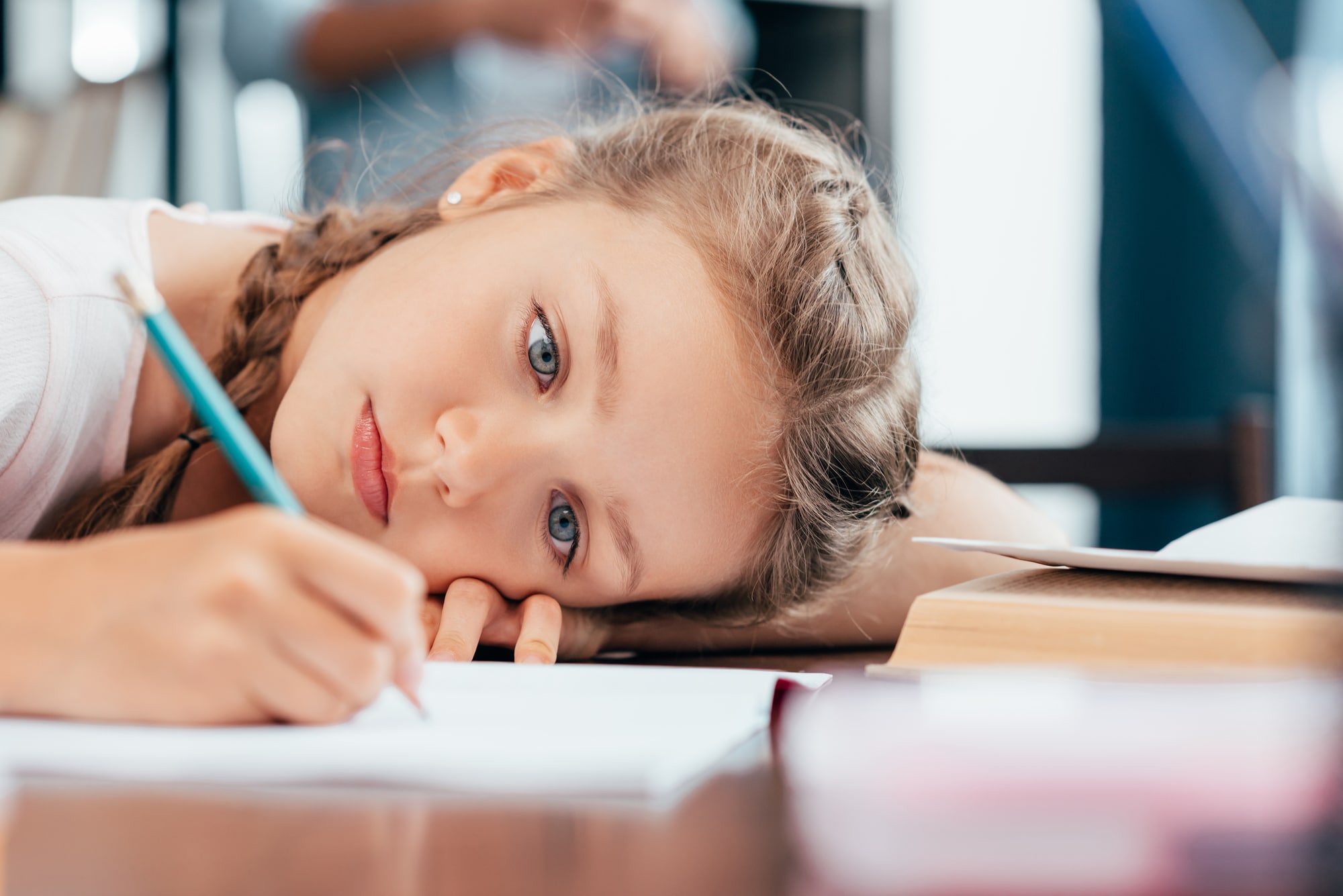Public-School-at-Home Is Not Homeschooling
Right now, many (many!) parents are having to teach their children at home because their children’s schools are closed. All over the media and social media, people are using the word “homeschooling” to describe what these parents are doing. Technically, you could say that they are homeschooling, but in reality, what they’re doing is not true homeschooling. They are doing public-school-at-home. Even those of us who homeschool are having to do quarantine schooling right now, which also isn’t the same as true homeschooling. What are the differences? Why does it matter? We’ll talk about it right now!

Why does it matter if people call it homeschooling when they are actually doing public-school-at-home?
First, people who are currently doing public-school-at-home (and the general public) are getting a very skewed idea of what homeschooling really is. The truth is that those parents might love homeschooling, but they’ll never know it (or be willing to try it) if they think what they’re being forced to do now is what we homeschooling families do.
Second, when people see so many parents and celebrities talking about how they hate “homeschooling,” how they’re failing at it, and how their kids hate it, they think this is how homeschooling is for all of us. They think it’s an awful atrocity that isn’t successful. They think parents and children who homeschool are all miserable failures and that the children aren’t learning anything.
Why does it matter what people think of homeschooling?
We need the support of friends and family members.
As a homeschooling mom for over 20 years, I can tell you that it makes a big difference (in a very positive way) when we homeschooling families have the support of friends and, especially, of family members. It is a huge asset to a homeschooling family if the grandparents in particular are willing and able to support a family’s homeschool.
Grandparents have years of wisdom and understanding that children can benefit from, and it is a wonderful thing when they actively participate in helping teach some subjects–even subjects such as gardening, woodwork, home-economics, and other non-academic subjects. I’ve known grandparents who are experts in academic subjects too, such as foreign language, math, and Bible. The grandparents took over teaching those classes, and it was a wonderful opportunity for the children to learn from experts and to spend time with their grandparents.
If those friends and family members think what we’re doing is doomed to fail miserably or if they think our children aren’t learning anything, they (of course!) are not going to support us. In fact, they will probably feel the need to try to caution us against homeschooling, and some of them may even put negative thoughts about homeschooling and its success in the heads of our children. I don’t know about you, but I think it is terribly wrong for people to take children aside and undermine the children’s feelings and attitudes toward their own parents and the parents’ choices for their own children.
I’ve seen how much damage it can do when family members tell children negative things about homeschooling.
When people share their negative opinions of homeschooling with homeschooling children (or in front of them), it can cause the children to have self-confidence issues. After all, if the children think their parents are purposely giving them an inadequate education or even if they simply believe their parents are purposely keeping them from going to school for some other selfish reason, the children are likely to think they personally have some deficiency or problem.
It can cause problems in the children’s relationships with their parents because they feel like their parents don’t want what’s best for them (when generally the opposite is true).
It can even plant very inaccurate ideas in children’s minds (especially older students) who start to worry if they’ll be able to get into college or find a good job one day. All of these negative ideas have been proven to be false, but children are vulnerable and may be swayed into believing these falsehoods by the inaccurate opinions of adults who aren’t knowledgeable about homeschooling.
(I should say that, often, adults who spread these false ideas truly don’t understand homeschooling and truly do believe these falsehoods to be accurate. They mistakenly believe they are doing the family a favor by sharing their thoughts and feelings about homeschooling without realizing they believe common misconceptions to be true. This also underscores the importance of doing your research before settling on your opinion of homeschooling–or anything else!)
What is public-school-at-home, and how is it different than homeschooling?
What is public-school-at-home?
Public-school-at-home is literally when children are given school work by public school teachers to be done at home instead of those children physically attending a public school and doing school work there. When children do public-school-at-home, it is common for every child in the class to get the same assignments and be expected to do the same work as everyone else in that class. There may be some differentiation (for children who are in special education classes or who speak English as a second language, for example), but for the most part, all of the children are doing the same assignments.
Public-school-at-home usually doesn’t allow for children with different interests, attention spans, or strengths and weaknesses to vary the assignments to better fit particular students. It also often contains busywork. Busywork is simply work that is given to the students to keep them busy even if it’s not particularly beneficial or necessary. If a teacher has a classroom full of students and must teach those students math for 45 minutes, he or she has to keep those students busy and working for the entire class period (or at least most of it). That means students who, for example, are fantastic at long division must complete all of the same long division problems as students who need more practice. Why does it matter? Because it is simply boring and frustrating for most students who are great at long division to have to do 50 math problems just for the sake of keeping busy. If a homeschooled student is great at long division, that student’s parent may choose to only have him/her do 10 long division problems to keep the skill fresh rather than doing an excessive number of problems just to keep busy.
Isn’t is wrong to vary a student’s assignments based on his/her interests, attention span, or strengths and weaknesses? Shouldn’t all students have to do the same work?
The answer is no, it’s not wrong and students should not all have to do the same work. I have a friend who is about to graduate from college with her teaching degree. (And I have a teaching degree myself and was a middle school teacher before I had my children and decided to homeschool them.) Her college classes stress the importance of varying instruction according to students’ strengths and weaknesses.
You might think that’s great! It’s a good reason why public school is just as beneficial as homeschooling, right? The problem, though, is that it’s almost impossible to do in today’s classrooms. This friend (who has worked as a teacher’s assistant for many years) knows all too well that, while it would be wonderful to vary instruction for different children, it’s not practical to do so in a real classroom. In fact, she spends so much time doing paperwork and preparing her children to take standardized tests that there’s hardly time to vary instruction or even provide supplemental instruction for students who need extra help. The only way to provide this kind of instruction would be for the student/teacher ratio to be much much smaller (like it is in homeschool settings).
As far as varying instruction, we also need to take into consideration students at the high school level. We would never suggest that all high school students be forced to take exactly the same classes. Why? Because we know that some will be English teachers, some will be mechanics, some will be business men or women, and some will be entrepreneurs. They don’t all have the same interests, needs, strengths, or goals for the future. They need to take classes that will allow them to reach their employment and personal goals in the future.
How is it different than homeschooling?
Homeschools have lower student-to-teacher ratios that allow varying instruction.
For one thing, homeschooling has a much lower student-to-teacher ratio. Even large homeschool families still don’t have 25 or 30 students per teacher. This lower student-to-teacher ratio allows the teacher (the parent) to understand each of *her children’s needs and strengths and weaknesses. This also allows her to vary instruction based on each child’s needs. *There are some homeschooling parents who are dads, but most are moms. To simplify matters, I’m referring here to the homeschooling parent as a woman.
Homeschools can more easily add fun educational activities to daily learning.
Second, homeschooling families can, mainly because of the smaller number of students, more easily add in fun educational activities to supplement the curriculum and help children remember what they’re learning. I remember when my children were younger (I have two adults and a high school junior) how we used to practice spelling words while tossing a ball or by writing them outside with sidewalk chalk. We practiced math facts while taking walks together or while playing math games or while cooking together. We learned science by going on nature walks, playing games, reading all kinds of science-related books and doing experiments. We read history books along with historical fiction (to help the information come alive) and, when appropriate, watched movies set during the time period we were studying.
We did all kinds of supplemental activities that were not only fun, but they also allowed a much deeper understanding of the material we were studying. And, besides those benefits, they helped my children remember what they learned because we all remember more of what we learn when we’re having fun!
Homeschooled children are, in general, better socialized than public school children.
Yes! It’s true. And yes, I am aware that many people who don’t understand the true nature of homeschooling think just the opposite is true. And yes, I do understand that there are a few homeschooled students who are not well socialized just as there are public school students who aren’t well socialized. The act of going to a school does not automatically make a child well socialized. It is, of course, socializing with others that accomplishes this.
So how can I say that homeschooled children are better socialized? Because it’s true! The vast majority of homeschooled students see and interact with people of a variety of ages on a regular basis while most school children spend all day in a classroom full of other children of almost exactly the same age.
Can you truly say that a 6th grader who only knows how (or is only willing) to interact with other 6th graders is as well socialized as a 6th grader who is willing and able to talk with other children and adults of all ages? I don’t think so! And for those who believe we must send our children to school to learn to live in the “real world” and get along with people in, for example, the work place when they grow up, I have to wonder how that even makes sense. I know a lot of men and women who have jobs, and I must say I don’t know a single one who only works with other adults who are the same (or almost the same) exact age.
Homeschooled children tend to score higher on standardized tests.
Again, many people who aren’t informed about homeschooling mistakenly believe that homeschooled children don’t learn anything. They think parents who homeschool don’t teach their children and that those children aren’t well educated. I don’t know why a parent would choose to keep her children home with her if she didn’t intend on teaching them. After all, it would be easier to send them to public school than to teach them at home.
No matter what your opinion is, though, research shows that homeschooled students on average perform better than public school students on standardized tests. Which actually makes perfect sense. Parents who choose to homeschool generally do so because they have a desire to teach their children. They want their children to be well educated. They want to spend time with their children. And they want to provide a safe and supportive environment for their children as they learn. Of course there are many reasons why parents choose to homeschool, but these are some of those reasons, and they’re good ones!
No matter what the reason, though, you can check the research for yourself to see that homeschooled children tend to outperform public school children on standardized tests.
What about homeschool parents who abuse their children? Isn’t it safer for children to be sent to school so the government can make sure they’re safe?
I have to say that, personally, this is one of the anti-homeschool arguments that I find to be completely ridiculous! There is literally zero research showing that homeschooled children are at higher risk of being abused than public school children. In fact, I’ve seen many news stories about public school children being abused by teachers and bullied by other students.
Yes, there have been some very high-profile cases in which homeschooled children were being abused. However, there are many more children who go (or went) to public school who were being abused, so obviously the simple fact that a child attends public school does not protect him or her from being abused. (As I stated, abuse of students who go to public school often happens because those children go to public school since the abuse is done by teachers and other students.)
And, if we’re going to make the government responsible for making sure all children aren’t being abused, what about babies who aren’t yet school age? Do we need to start having the government come to our homes to regularly check to be sure our babies aren’t being abused? Or should we require that parents put their babies in daycare from birth in order to be sure they’re being monitored for abuse? Most of us think these suggestions are ludicrous, but when we give the government responsibility for parenting our children, they will most certainly take that responsibility (especially if we willingly give it to them), and eventually they will take it away from us as parents. Then it will be too late for us to do anything about it.
Quarantine schooling is not true homeschooling. How are they different?
Quarantine schooling is a new term that’s being used to describe homeschooling during the time that many of us are in quarantine due to coronavirus. Those of us who homeschool (just like those who have children in public school) are living very different lives right now. We aren’t able to go on field trips, have play dates, have holiday parties, attend co-ops, put on plays or musical performances, go to the library, participate in sports or clubs, and so many of the other activities we normally do on a daily or weekly basis. Instead, we’re at home day after day.
One reason we homeschoolers like to be certain others understand the difference between quarantine schooling and homeschooling is that homeschoolers often participate in a variety of activities (like the ones I mentioned above), and we’re not able to do that right now. This might give some people the idea that the way we’re living right now is the way we normally live–in isolation. I mentioned earlier that there are a small number of homeschoolers who do keep more or less to themselves, but the majority of us have very healthy social lives and lots of interaction with others.
Also, many homeschooling parents (like many parents of public school students) are struggling to deal with anxiety and the extra demands of being in quarantine right now. It’s difficult to be required to stay home all the time. We’re dealing with worrying about friends and relatives that we can’t see right now and who may be sick or need care. We’re not able to go out to eat to ease the burden (and boredom) of cooking and eating and doing dishes three times a day every day. Some aren’t able to go outside at all to take a walk or get some exercise. Some are worried about being able to pay the bills because they aren’t allowed to work right now and may not even have jobs to go back to after this is over.
In other words, even those of us who homeschool find that our homeschools may be affected by this extra stress and anxiety right now, but we’re hanging in there and doing the best we can under the circumstances. We, like parents of public school students, will be glad when things return to a more normal way of life so we can get back to our regular activities.
So what’s the point?
The point is that those of us who homeschool want you to know what homeschooling is and what it isn’t. We want you to know that it’s not public-school-at-home, and it’s not quarantine schooling. It is a wonderful and effective way of educating our children and a lovely way of bringing up children who are well socialized and who make good workers and citizens as adults.
By checking a few reputable sources, those who hold outdated and mistaken beliefs about homeschooling can easily see the truth–that homeschoolers are, for the most part, very well educated, well socialized, and well cared for. We hope those of you who are interested in learning more about homeschooling and what is really is will take the time to read some articles on our site and do some research to learn more about it. We think you will like what you learn!
If you have questions about homeschooling, we’ll be glad to try to answer them for you! Just leave them in the comments.
What do I do if I want to start homeschooling?
If you want to start homeschooling but aren’t sure what steps to take, we have an article with information to help you! Click here to read How to Homeschool: 5 Simple Steps.
Would you like some free printable resources to use with your children during the quarantine?
And if you’re at home with children due to the current situation, feel free to download any of our printables (both in the shop here on Hip Homeschool Moms and on our sister site, Only Passionate Curiosity) for free using the discount code coronahelp.









With an open and accepting mind, I began reading your blogpost. I agree with you—that people shouldn’t criticize parents who homeschool their children. I was offended, however, when you began listing the cons of public school. As a public school teacher since 1995, I find your description of public education and educators to be inaccurate. You do you, but please don’t disparage what other educational communities do.
Thank you for your comment. I don’t want to offend or upset those who choose the public school option. But I truly do believe (from my own experience as a teacher before I began homeschooling my children and from the current experiences of close friends and family members who are teaching in public schools) that what I said is true. My main point, though, is that public-school-at-home is not the same as homeschooling. The media calls them both homeschooling, so many parents mistakenly believe they are the same, and that is not the case. Homeschooling allows for much more personalization and socialization, and that is important for potential homeschooling families to understand.
I’m so glad to see so many truths about true homeschooling highlighted here and so many myths debunked. This isolation schooling may be school at home but it is not representative of our homeschool life which is full of activities, friends, destinations worth exploring, sports, volunteer opportunities, and clubs, plus a deeply satisfying love of learning .
I think that the main difference is that parents that homeschool have made a choice and have the resources and time to do that and had the time to plan themselves into their double role of parent and teacher. Some are good teachers , some are not , like in public school. Mostly they are stay at home middle class mums who once dreamed to be a teacher. Nothing wrong with this. But not all of us parents are. Quarantine school has asked most parents the improvisation of school, sometimes under guidance of teachers and syllabus. For example I know very well that my child math teacher is a poor teacher, the method she uses is rather inadequate to the learning styleof my child and there are books out there that could teach me better ways to teach maths to my child. If I was successful in mastering that method I could teach my child. But I happen to have a job, a family to run and I’m not very quick in math. Repeat for English that is not my first language and other subjects…In principle we could be better educators for our children, in reality most of us and our children profit from the division of labor, children profit from socialising with other children, with their teachers. So I agree that quarantene school is not what most parents who choose homeschooling are practicing. But there are also good reasons why homeschooling should not replace public schooling for most of us. An academic friend who was homeschooled pointed out that he profited most from the books that where in the shelves in his family, the dinner table discussions, the TV shows they commented that from the ” lessons ” of his parents. I think this is truth also about public school, you learn a lot from your family cultural environment, but with home schooling you are more exposed to your family’s culture. The problem are the books that are not on the shelves, the informed discussions that do not take place at most dinner tables (if dinner is served at all)…
I agree with some of what you said, but it’s simply not accurate that most parents who homeschool are moms who once dreamed of being teachers. Many of us had no intention at all of homeschooling, but we realized we had to do something different when the public school system wasn’t working for our children for various reasons. Also, you imply that homeschoolers aren’t allowed to properly socialize, which is highly inaccurate. There is research to prove that homeschooled students are very well socialized and actually benefit from interacting with other children (and adults) of various ages instead of only with peers of the same age/grade level. Since adults interact with people of various ages on a daily basis, the kind of socialization most homeschoolers receive is actually much more like what they will experience as adults. Research also proves that the majority of homeschooled students perform better on standardized tests than students who attend public school, so homeschooling is an excellent educational option. Something else to keep in mind is that (unlike years ago) there are many options for co-ops or online classes for parents who don’t feel confident teaching certain subjects. I do not believe that homeschooling is best for all students. Some parents don’t want to homeschool or feel they can’t for some other reason. That’s okay. But for those who do choose to homeschool, it is an excellent option for both socialization and education, so parents should not allow those misconceptions to keep them from homeschooling if that’s what they want to do and what they believe is best for their children. This article includes links to show details about the research I mentioned: https://hiphomeschoolmoms.com/if-your-husband-doesnt-support-your-desire-to-homeschool/.
I home-schooled my three children for a total of 20 years… no it was not public school curriculum. Absolutely different, with different motives, and different goals, as well as different problems. But well worth the effort! If I had it to do all over again, yes I would, with a few changes from what we learned. However, still I am glad we did it.